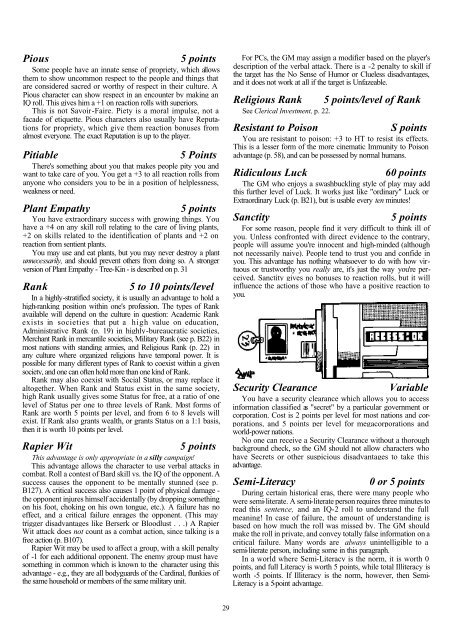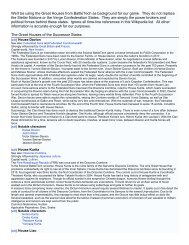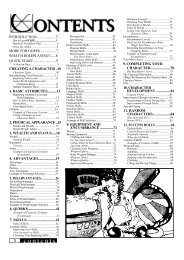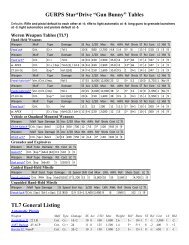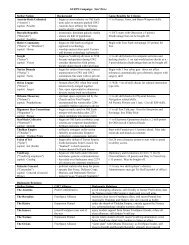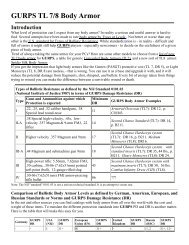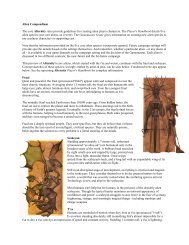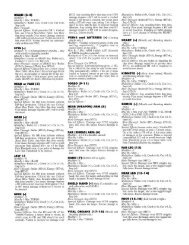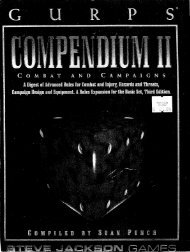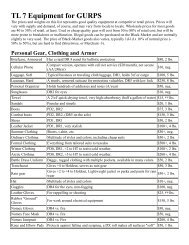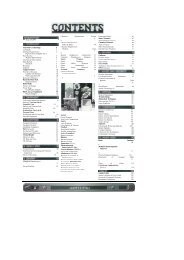GURPS - Compendium 1..
GURPS - Compendium 1..
GURPS - Compendium 1..
Create successful ePaper yourself
Turn your PDF publications into a flip-book with our unique Google optimized e-Paper software.
Pious<br />
5 points<br />
Some people have an innate sense of propriety, which allows<br />
them to show uncommon respect to the people and things that<br />
are considered sacred or worthy of respect in their culture. A<br />
Pious character can show respect in an encounter by making an<br />
IQ roll. This gives him a +1 on reaction rolls with superiors.<br />
This is not Savoir-Faire. Piety is a moral impulse, not a<br />
facade of etiquette. Pious characters also usually have Reputations<br />
for propriety, which give them reaction bonuses from<br />
almost everyone. The exact Reputation is up to the player.<br />
Pitiable<br />
5 Points<br />
There's something about you that makes people pity you and<br />
want to take care of you. You get a +3 to all reaction rolls from<br />
anyone who considers you to be in a position of helplessness,<br />
weakness or need.<br />
Plant Empathy<br />
5 points<br />
You have extraordinary succes s with growing things. You<br />
have a +4 on any skill roll relating to the care of living plants,<br />
+2 on skills related to the identification of plants and +2 on<br />
reaction from sentient plants.<br />
You may use and eat plants, but you may never destroy a plant<br />
unnecessarily, and should prevent others from doing so. A stronger<br />
version of Plant Empathy - Tree-Kin - is described on p. 31<br />
Rank<br />
5 to 10 points/level<br />
In a highly-stratified society, it is usually an advantage to hold a<br />
high-ranking position within one's profession. The types of Rank<br />
available will depend on the culture in question: Academic Rank<br />
exists in societies that put a high value on education,<br />
Administrative Rank (p. 19) in highly-bureaucratic societies,<br />
Merchant Rank in mercantile societies, Military Rank (see p. B22) in<br />
most nations with standing armies, and Religious Rank (p. 22) in<br />
any culture where organized religions have temporal power. It is<br />
possible for many different types of Rank to coexist within a given<br />
society, and one can often hold more than one kind of Rank.<br />
Rank may also coexist with Social Status, or may replace it<br />
altogether. When Rank and Status exist in the same society,<br />
high Rank usually gives some Status for free, at a ratio of one<br />
level of Status per one to three levels of Rank. Most forms of<br />
Rank are worth 5 points per level, and from 6 to 8 levels will<br />
exist. If Rank also grants wealth, or grants Status on a 1:1 basis,<br />
then it is worth 10 points per level.<br />
Rapier Wit<br />
5 points<br />
This advantage is only appropriate in a silly campaign!<br />
This advantage allows the character to use verbal attacks in<br />
combat. Roll a contest of Bard skill vs. the IQ of the opponent. A<br />
success causes the opponent to be mentally stunned (see p.<br />
B127). A critical success also causes 1 point of physical damage -<br />
the opponent injures himself accidentally (by dropping something<br />
on his foot, choking on his own tongue, etc.). A failure has no<br />
effect, and a critical failure enrages the opponent. (This may<br />
trigger disadvantages like Berserk or Bloodlust . . .) A Rapier<br />
Wit attack does not count as a combat action, since talking is a<br />
free action (p. B107).<br />
Rapier Wit may be used to affect a group, with a skill penalty<br />
of -1 for each additional opponent. The enemy group must have<br />
something in common which is known to the character using this<br />
advantage - e.g., they are all bodyguards of the Cardinal, flunkies of<br />
the same household or members of the same military unit.<br />
For PCs, the GM may assign a modifier based on the player's<br />
description of the verbal attack. There is a -2 penalty to skill if<br />
the target has the No Sense of Humor or Clueless disadvantages,<br />
and it does not work at all if the target is Unfazeable.<br />
Religious Rank<br />
See Clerical Investment, p. 22.<br />
Resistant to Poison<br />
5 points/level of Rank<br />
S points<br />
You are resistant to poison: +3 to HT to resist its effects.<br />
This is a lesser form of the more cinematic Immunity to Poison<br />
advantage (p. 58), and can be possessed by normal humans.<br />
Ridiculous Luck<br />
60 points<br />
The GM who enjoys a swashbuckling style of play may add<br />
this further level of Luck. It works just like "ordinary" Luck or<br />
Extraordinary Luck (p. B21), but is usable every ten minutes!<br />
Sanctity<br />
5 points<br />
For some reason, people find it very difficult to think ill of<br />
you. Unless confronted with direct evidence to the contrary,<br />
people will assume you're innocent and high-minded (although<br />
not necessarily naive). People tend to trust you and confide in<br />
you. This advantage has nothing whatsoever to do with how virtuous<br />
or trustworthy you really are, it's just the way you're perceived.<br />
Sanctity gives no bonuses to reaction rolls, but it will<br />
influence the actions of those who have a positive reaction to<br />
you.<br />
Security Clearance<br />
Variable<br />
You have a security clearance which allows you to access<br />
information classified as "secret" by a particular government or<br />
corporation. Cost is 2 points per level for most nations and corporations,<br />
and 5 points per level for megacorporations and<br />
world-power nations.<br />
No one can receive a Security Clearance without a thorough<br />
background check, so the GM should not allow characters who<br />
have Secrets or other suspicious disadvantages to take this<br />
advantage.<br />
Semi-Literacy<br />
0 or 5 points<br />
During certain historical eras, there were many people who<br />
were semi-literate. A semi-literate person requires three minutes to<br />
read this sentence, and an IQ-2 roll to understand the full<br />
meaning! In case of failure, the amount of understanding is<br />
based on how much the roll was missed by. The GM should<br />
make the roll in private, and convey totally false information on a<br />
critical failure. Many words are always unintelligible to a<br />
semi-literate person, including some in this paragraph.<br />
In a world where Semi-Literacy is the norm, it is worth 0<br />
points, and full Literacy is worth 5 points, while total Illiteracy is<br />
worth -5 points. If Illiteracy is the norm, however, then Semi-<br />
Literacy is a 5-point advantage.<br />
29


